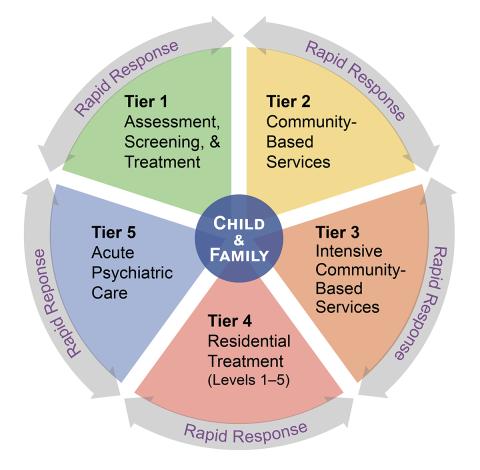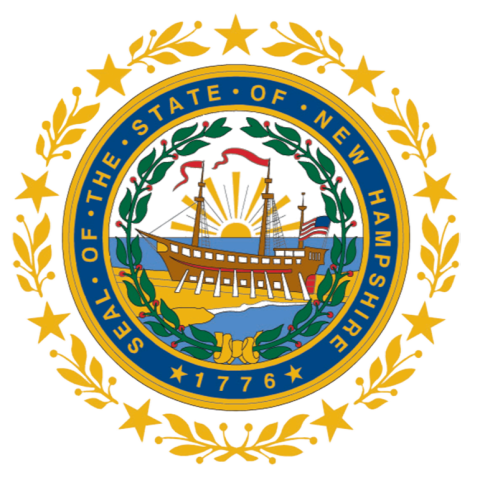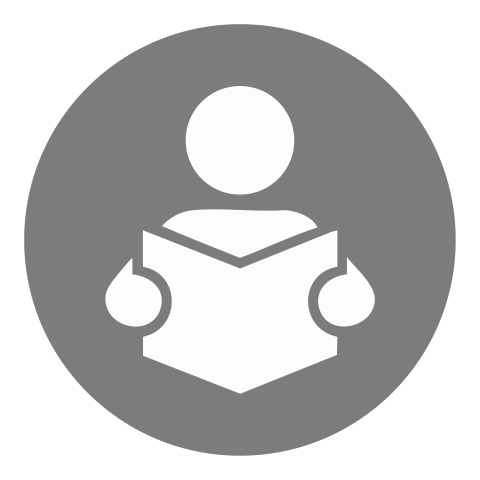Search for available services, supports, and treatments near you.
Check out our resource library to learn more about different topics.
Featured
Learn about the Magnify Voices Expressive Arts Contest for NH youth.
This space is for families, caregivers, youth, and others searching for ways to help a child or youth with a mental health or substance use concern. Supports, services, and treatments can help when you are seeing or experiencing emotional distress concerning behaviors, drug or alcohol use, or other signs of a behavioral health issue.
New Hampshire has created a Children’s System of Care to organize services into 5 tiers or levels based on what your child and your family need: from lower levels of care (Tier 1) to the highest intensity, which is hospital care and psychiatric residential treatment (Tier 5). Assessments are provided at each Tier to ensure that your child or youth is matched to the best service, support, or treatment given their needs.
Where do I start?
- Talk to your pediatrician or family doctor. Many pediatric offices have behavioral health practitioners that work within their group or have clinicians they typically refer to. Getting an appointment with a mental health specialist is typically easier if another health care professional refers you.
- Call or email the New Hampshire chapter of the National Alliance on Mental Illness (NAMI NH) Information & Resource Line. They can also connect you to resources and services: Email or call 1-800-242-6264 extension 4.
- Call the community mental health center in your area to see if they have any openings and get on their waiting lists if they have them. To find your mental health center: NH Community Behavioral Health Association.
- See if you and your child can meet with the school counselor or school nurse. Federal and state law requires public schools to provide mental health care if a mental health problem interferes with the student’s academics.
- Talk to others who have had a similar experience.
- Explore the National Alliance on Mental Illness (NAMI) Resource page – they have a directory for finding mental health care for your child.
Tiers of Care
The tiered system organizes services and supports into 5 levels of intensity: from lower levels of care (Tier 1) to the highest intensity, which is hospital-level care and psychiatric residential treatment (Tier 5).

Care That Meets Your Needs
Tier 1: Assessment, Screening, and Treatment
If you are looking for:
- Basic information about community behavioral health services and providers.
- Information about prevention and early intervention programs.
- A behavioral health assessment or screening for a child or youth.
Tier 2: Community-Based Services
If you are looking for information about:
- Community-based providers and services for your child when there is a concern for mental health or substance use.
- Specific types of outpatient treatments and supports for your child and your family.
- How to find treatment and supports if you are a youth looking for help.
Tier 3: Intensive Community-Based Services and Supports
If you are looking for information about:
- Supports that can help you if you have multiple providers involved with your child’s mental health or substance use treatment.
- Services that are more intensive than outpatient treatment, but are still provided in your home or community.
- How to sort through a complex mental health or substance use concern.
Tier 4: Residential Treatment
Explore your options here if:
- You are seeing unsafe behaviors and feeling unsafe.
- You are a youth who is feeling unsafe or overwhelmed.
- The behaviors are not within your control.
- You are unsure if you or the child can function safely at home or in the community.
Tier 5: Acute Psychiatric Care
Explore your options here if:
- Your child or youth is in an immediate and potentially dangerous situation due to mental distress or drug or alcohol issues.
- You feel the situation is not within your control.
- You need hospital-level acute crisis care for your child.
What We Mean by "Behavioral Health"
Behavioral Health covers both mental health and substance use. Mental health concerns can include problems like depression, anxiety, aggression, and attention problems. Substance use concerns among people under age 18 can include the use of any substances, using alcohol, tobacco, cannabis, amphetamines, or opioids, or misuse of prescription drugs. Seek an assessment and professional help when the mental health or substance misuse issues last more than a few weeks or interfere with your child’s or youth’s everyday life, such as refusing to get out of bed, a major change in mood, hanging out with people who use drugs and alcohol, getting suspended from school more than once for behavior problems, among others.





